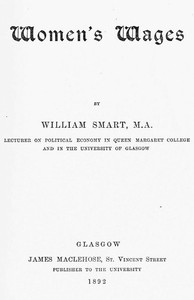Women's Wages by William Smart
"Woman's Wages" by William Smart is a socio-economic study written during the late 19th century. The book addresses the disparity between women's wages and men's wages in various industries, particularly in Britain, where it highlights the systemic undervaluation of women's labor. Smart, a lecturer on political economy, provides a critical examination of the economic factors influencing these wage differences, alongside the socio-cultural contexts that perpetuate them. In "Woman's Wages," Smart systematically deconstructs
the reasons behind the wage gap between men and women. He identifies several key factors, including competition among women for low-paying jobs, the traditional assumption that women's wages are supplemental to men's, and the often lower perceived value of goods produced by women. Through a detailed analysis of statistics and real-world examples from various trades, such as textiles and teaching, Smart argues that women are disproportionately affected by low wages due to structural inequalities and a lack of effective organization within their labor force. He emphasizes the need for advocacy and reform to establish equal pay for equal work, positing that societal attitudes have impeded progress towards wage equality, thereby forcing women to accept lower wages that do not reflect their contributions or needs. (This is an automatically generated summary.)
Read or download for free
| How to read | Url | Size | |||
|---|---|---|---|---|---|
| Read now! | https://www.gutenberg.org/ebooks/52959.html.images | 72 kB | |||
| EPUB3 (E-readers incl. Send-to-Kindle) | https://www.gutenberg.org/ebooks/52959.epub3.images | 58 kB | |||
| EPUB (older E-readers) | https://www.gutenberg.org/ebooks/52959.epub.images | 57 kB | |||
| Kindle | https://www.gutenberg.org/ebooks/52959.kf8.images | 88 kB | |||
| older Kindles | https://www.gutenberg.org/ebooks/52959.kindle.images | 79 kB | |||
| Plain Text UTF-8 | https://www.gutenberg.org/ebooks/52959.txt.utf-8 | 65 kB | |||
| Download HTML (zip) | https://www.gutenberg.org/cache/epub/52959/pg52959-h.zip | 50 kB | |||
| There may be more files related to this item. | |||||
About this eBook
| Author | Smart, William, 1853-1915 |
|---|---|
| Title | Women's Wages |
| Note | Reading ease score: 63.9 (8th & 9th grade). Neither easy nor difficult to read. |
| Credits |
Produced by WebRover, Chris Curnow, Martin Pettit and the Online Distributed Proofreading Team at http://www.pgdp.net (This file was produced from images generously made available by The Internet Archive) |
| Language | English |
| LoC Class | HD: Social sciences: Economic history and conditions, Production |
| Subject | Wages -- Women |
| Subject | Sex discrimination against women |
| Subject | Equal pay for equal work |
| Category | Text |
| EBook-No. | 52959 |
| Release Date | Sep 2, 2016 |
| Copyright Status | Public domain in the USA. |
| Downloads | 52 downloads in the last 30 days. |
| Project Gutenberg eBooks are always free! | |

